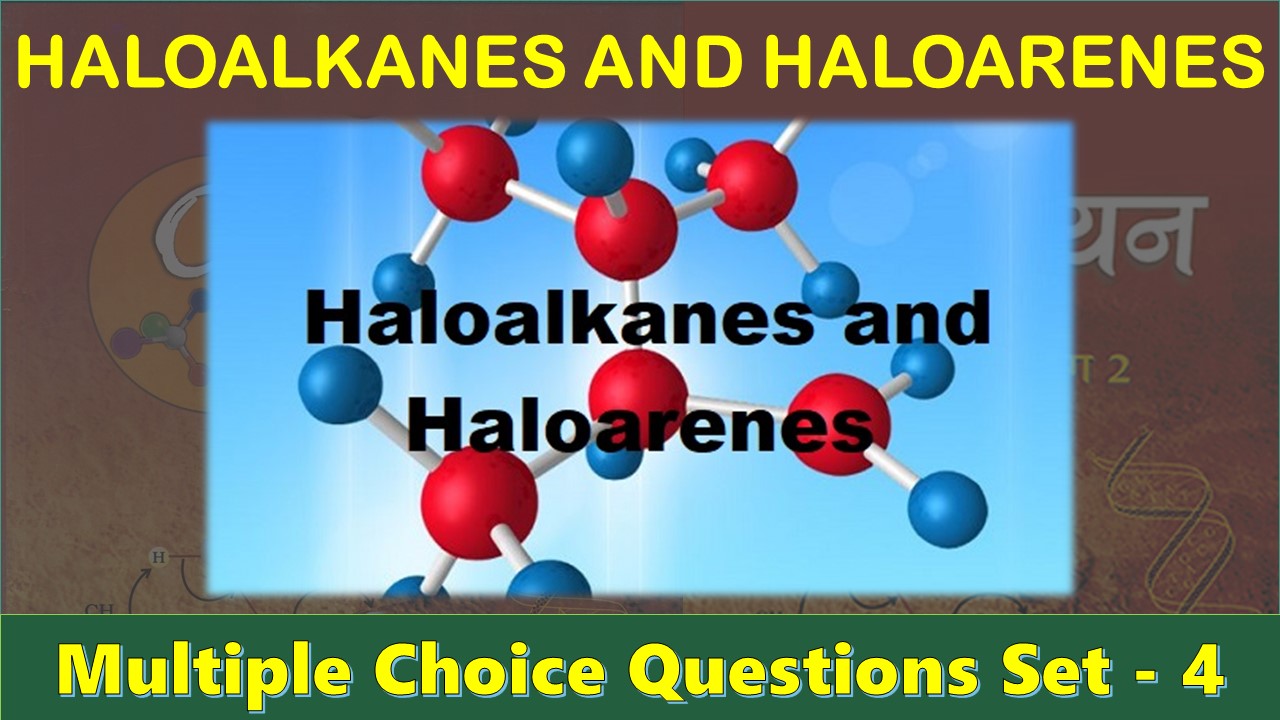CBSE Class 12 Haloalkanes and Haloarenes with Answers Multiple Choice Questions with Answers. MCQ Questions Class 12 Haloalkanes and Haloarenes with Answers with Answers Is Prepared Based on Latest Exam Pattern. Students can solve NCERT Class 12 Haloalkanes and Haloarenes with Answers MCQs with Answers to know their preparation level.
Students who are searching for NCERT MCQ Questions for Class 12 Haloalkanes and Haloarenes with Answers with Answers are compiled here to get good practice on all fundamentals. Know your preparation level on MCQ Questions for Class 12 Haloalkanes and Haloarenes with Answers with Answers. You can also verify your answers from our provided MCQ Class 12 Haloalkanes and Haloarenes with Answers with Answers. So, ace up your preparation with MCQ of Class 12 Chemistry Examinations.
MCQ Questions Class 12 Haloalkanes and Haloarenes with Answers - Set - 4
Question 1:
In Friedel-Crafts synthesis of toluene, reactants in addition to anhydrous AlCl3 are:
(a) C6H6 + CH4
(b) C6H6 + CH3Cl
(c) C5H5Cl + CH3Cl
(d) C6H5Cl + CH4
Correct Answer – (B)
Question 2:
The most reactive nucleophile among the following is
(a) CH3O–
(b) C6H5O–
(c) (CH3)2CHO–
(d) (CH3)3 CO–
Correct Answer – (A)
Question 3:
Industrial preparation of chloroform employs acetone and
(a) phosgene
(b) calcium hypochlorite
(c) chlorine gas
(d) sodium chloride
Correct Answer – (B)
Question 4:
Benzene reacts with n-propyl chloride in the presence of anhydrous AlCl3 to give
(a) 3-propyl-1-chlorobenzene
(b) n-propylbenzene
(c) no reaction
(d) isopropylbenzene
Correct Answer – (D)
Question 5:
Grignard reagent is prepared by the reaction between
(a) magnesium and alkane
(b) magnesium and aromatic hydrocarbon
(c) zinc and alkyl halide
(d) magnesium and alkyl halide
Correct Answer – (D)
MCQ Questions Class 12 Haloalkanes and Haloarenes With Answers
Question 6:
CH3CH2CHCl CH3 obtained by chlorination of n-butane, will be
(a) meso-form
(b) racemic mixture
(c) d-form
(d) 1-form
Correct Answer – (B)
Question 7:
Phosgene is a common name for
(a) phosphoryl chloride
(b) thionyl chloride
(c) carbon dioxide and phosphine
(d) carbonyl chloride
Correct Answer – (D)
Question 8:
Which of the following is an optically active compound?
(a) 1-Butanol
(b) 1-Propanol
(c) 2-Chlorobutane
(d) 4-Hydroxyheptane
Correct Answer – (C)
Question 9:
Chlorobenzene reacts with Mg in dry ether to give a compound (A) which further reacts with ethanol to yield
(a) phenol
(b) benzene
(c) ethyl benzene
(d) phenyl ether
Correct Answer – (B)
Question 10:
Reaction of t-butyl bromide with sodium methoxide produces
(a) sodium t-butoxide
(b) t-butyl methyl ether
(c) isobutane
(d) isobutylene
Correct Answer – (D)
- NCERT Solutions Class 11 Chemistry Chapter 1 : Some Basic Concepts of Chemistry
- NCERT Solutions Class 11 Chemistry Chapter 2 : Structure Of The Atom
- NCERT Solutions Class 11 Chemistry Chapter 3 : Classification of Elements and Periodicity in Properties
- NCERT Solutions Class 11 Chemistry Chapter 4 : Chemical Bonding and Molecular Structure
- NCERT Solutions Class 11 Chemistry Chapter 5 : States of Matter
- NCERT Solutions Class 11 Chemistry Chapter 6 : Thermodynamics
- NCERT Solutions Class 11 Chemistry Chapter 7 : Equilibrium
- NCERT Solutions Class 11 Chemistry Chapter 8 : Redox Reactions
- NCERT Solutions Class 11 Chemistry Chapter 9 : Hydrogen
- NCERT Solutions Class 11 Chemistry Chapter 10 : The s-Block Elements
- NCERT Solutions Class 11 Chemistry Chapter 11 : The p-Block Elements
- NCERT Solutions Class 11 Chemistry Chapter 12 : Organic Chemistry: Some Basic Principles and Techniques
- NCERT Solutions Class 11 Chemistry Chapter 13 : Hydrocarbons
- NCERT Solutions Class 11 Chemistry Chapter 14 : Environmental Chemistry




